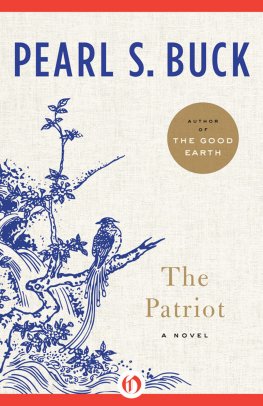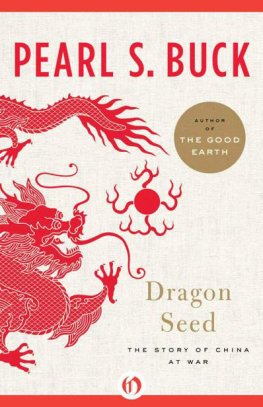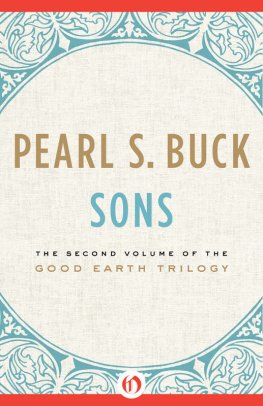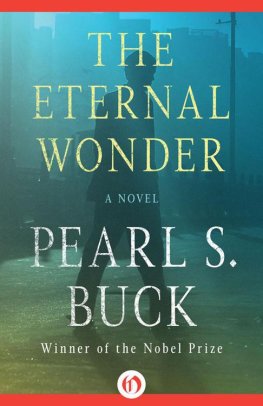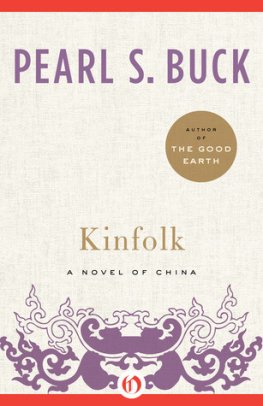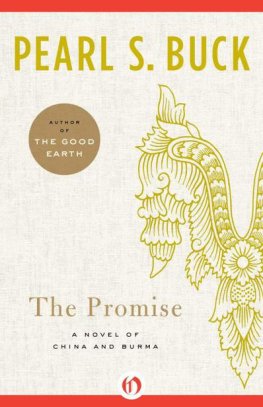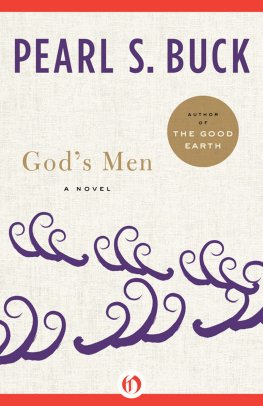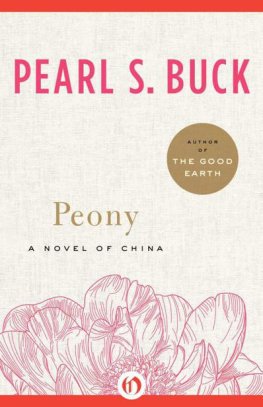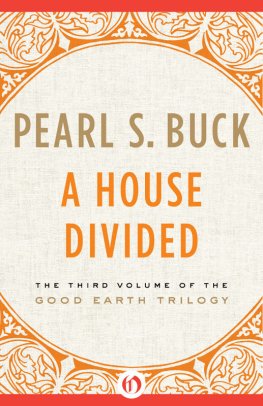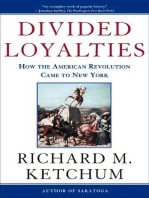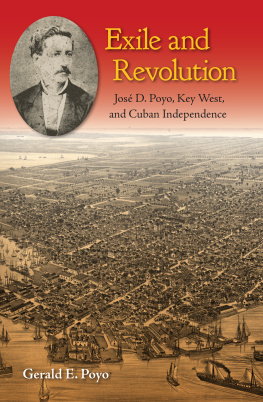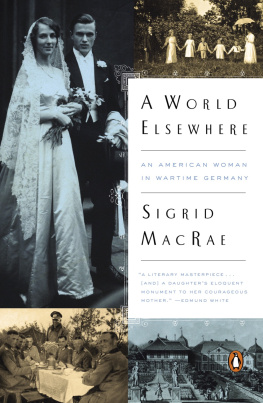THERE LIVED IN THE city of Shanghai in the fifteenth year of the Chinese Republic and in the western year nineteen hundred and twenty-six, a rich banker whose surname was Wu, who had two sons. His family for several generations had been wealthy, and for at least three had been known in the life of the city, although in differing ways. Mr. Wu held the familys present position because he was the head of the Great China Bank, which had branches all through central and southern China. He had as a young man gone abroad to Japan and to Europe to visit banks, and upon his return he had at once begun to build the bank which later became so powerful in the new republic.
But his father, old General Wu, had nothing to do with banks except, as a military man, to look at them hopefully in times of the war in which nevertheless he never fought. General Wu, in his youth during the late Manchu dynasty, had been sent abroad, not by his parents, who were indeed filled with terror at the idea so that his mother wept and refused food until he was allowed, by special imperial decree, to delay his going long enough to give her a grandson. Only when a red and crying child, now Mr. Wu the banker, was placed in her old arms immediately after his birth, did she allow General Wu, then an impetuous and handsome lad of eighteen, to go abroad. He was sent with several other young men, by the Emperor, during the brief years when it seemed that the dynasty would reform its old and obsolete army. But the reforms were never made. All the world knows that the strong and powerful Empress Dowager overruled her weak son, and put down his reforms, and General Wu found himself without money after less than two years in Berlin. His father sent him enough to come home, and it was at that time that the young officer perceived the importance of banks. Bankers, he decided, were the men who ruled nations, not emperors or kings, and he made up his mind forthwith that his two-year-old son should become a banker.
And he was able to do as he had decided. Before his ship reached the docks of Shanghai, his old father had died, and his mother, unable to linger after, killed herself by swallowing her jade and gold rings. General Wu, therefore, found himself at the head of the Wu family, since he was the only son, and its huge fortunes were his, as well as the ancestral houses and lands, which were not in Shanghai but far away in the inner province of Hunan.
The money was stored in curious places. Old Mr. Wu, deceased, had never understood or trusted banks. He looked upon them as a purely foreign scheme for extortion. His large sums of cash were therefore in the shape of silver shoes, which he kept in boxes under his own roof. General Wus first act was to deposit all these silver shoes in the vaults of various banks. His next was to use many of them in the building of a great square brick house in the French section of Shanghai, which was then the fashionable place to live. He hired a young French architect to build the house, and also to have it furnished. When it stood completed he moved his family into it, though it looked like a wealthy house in Paris and was not in the least Chinese. When his wife complained of its discomforts, such for instance as the thick carpets which meant that nothing could be dropped upon the floors, he reminded her that thousands of women in foreign countries had to put up with such discomforts. Thereafter he paid no attention to her. He lived in the house peacefully enough for forty years, while his eldest son grew up and became a banker and his other sons were born and grew up and went their ways. His daughters he never included in the number of his children, although he performed his duty and married them to well-to-do men, and having done his duty, ceased to think of them further. His eldest son continued to live with him and his aging wife in the large French house, and at the proper time was married to a well-educated young Shanghai lady, and by her he had his two sons, I-ko and I-wan.
Old General Wu was perfectly satisfied when these two grandsons were born. He had lived a peaceful life and had never been in a war nor seen a battle. But he was called General because the Emperor, long dead, had sent him to a German military school, and also because of his great wealth. Moreover, he possessed several uniforms, which he had ordered a Shanghai tailor to copy for him from the uniforms of an English general, an American admiral, and a French marshal when these officers visited Shanghai at various times and inspected the troops of their countries stationed there. Old General Wu was a handsome figure in any one of the uniforms, though the one he wore most often was a combination of them made after his own design, with an added touch of the Russian cossack. He did not, of course, wear these uniforms at home. There he wore soft old robes of heavy brocaded silks and satins and on his feet velvet shoes. But the uniforms hung in his closet and were brushed by a manservant at every change of season, when also all his medals, some of which he had bought and some of which had been presented to him by different persons who wanted money, were polished and put away again.
In this house I-ko and I-wan grew to young manhood with fair happiness, their chief trouble being only in the difference of their two natures. For I-wan had always been the favorite with the whole household, grandparents, parents, and servants. I-ko, the elder, was a pouting child, easily spoiled, who turned, it seemed naturally, to mischief and malice. But I-wan was cheerful and tender, and the same indulgence which had been so ruinous to I-ko seemed not to hurt him at all. He had reached his eighteenth year and had got into only one difficulty, which he had never had to explain to his grandparents and parents because they knew nothing about it. He had been arrested and put in jail. It is true that he remained there only one night. As soon as it became known whose son he was, the head jailer himself rushed into his cell, the sweat pouring down his face.
Sir, forgive me for being a fool, he cried to I-wan, who was sitting on three bricks piled one on top of the other in a corner of a crowded and filthy cell. But why didnt you tell me, sir, that your father is Mr. Wu, the banker, and your grandfather the old General?
If I deserve to go to jail, I deserve to go to jail, I-wan replied with majesty.
He was the only one among the prisoners who wore a silk robe, and the ends were draggled with filth. A young man who was in the cell with him had asked him scornfully, Why dont you tuck up your wonderful robe? He was a rough-looking young man in a government-school uniform of cheap blue cotton. I-wan himself went to a private school kept by missionaries for the sons of rich men. There they wore no uniforms, but always silk robes.
Because I have better ones, I-wan had replied.
It was at this moment that the jailer came in. When he heard what I-wan said, his face fell into still more alarm.
Dont be angry with me, young lord! he begged. Why, your father could have me thrown out of this pleasant jail if he liked! I am a poor man. Come out and I will hire a horse carriage and have you returned to your father unharmed. And when you reach home, plead for me, young sir, I beg you!
I-wan would have liked to refuse proudly. But he was only eighteen and he was tired and hungry, and the cell was foul. His cellmates, moreover, were a sullen and dirty-looking group of men of different sorts and ages, and of them all only the young student in the uniform seemed good. He rose, therefore, but with dignity, and went out.
But as the frightened jailer was about to lock the iron gate again I-wan paused.
Wait! he commanded. Let that student come out, also.

